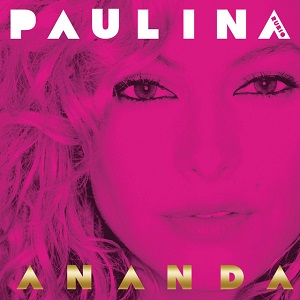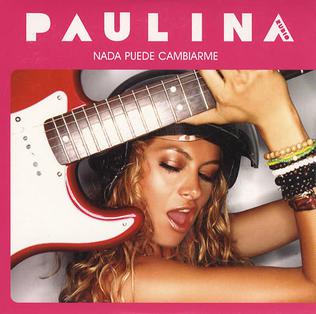
Paulina Susana Rubio Dosamantes is a Mexican singer, songwriter and television personality. Referred to as "The Golden Girl" and "Queen of Latin Pop", she first achieved recognition as a member of the successful pop group Timbiriche from 1982 through 1991. After leaving Timbiriche, she embarked on a solo career. Rubio has sold over 15 million records, making her one of the best-selling Latin music artists of all time.

Ananda is the eighth studio album by Mexican singer-songwriter Paulina Rubio, released on September 18, 2006, through Universal Latino. Its pop rock music incorporates latin, dance, folk, electropop, alternative and flamenco styles with instrumentation from synthpop beats, guitars, drums, synthesizers, strings and Spanish musical instruments. Its themes range from love, empowerment, and dancing. Contributions to the album's production came from a wide range of producers, including Cachorro López, Rick Wake, Tricky Stewart, Áureo Baqueiro, TOY Hernández and Gustavo Santaolalla. Among the songwriters and artist collaborators appear on the album are Xabi San Martín from La Oreja de Van Gogh, Slash from Guns N' Roses, Juanes, Julieta Venegas and Coti.

"Ni Una Sola Palabra" is a song by Mexican singer Paulina Rubio from her eighth studio album Ananda (2006). It was released on July 23, 2006, by Universal Latino, as the lead single from the album. Written by Xabi San Martín, keyboardist of the Spanish pop band La Oreja de Van Gogh, it was intended to be included in one of the band's albums, but Rubio took an interest in the song, and recorded it in 2005 at her home studio in Miami. The song was produced by Cachorro López. Musically, "Ni Una Sola Palabra" is a pop rock song with elements from synth-pop, new wave and electronic.

Pau-Latina is the seventh studio album by Mexican singer Paulina Rubio, released on February 10, 2004, by Universal Latino. Musically, Rubio wanted to make a "futuristic folk" or a "cocktail of different music genres", thus incorporating eclectic latin music in its sound with instrumentation from techno beats, guitars, drums, synthesizers, strings and Spanish guitars musical instruments. Its themes range from love, dancing, friendship and feminist. Contributions to the album's production came from a wide range of producers, including Emilio Estefan, Chris Rodríguez, Toy Hernández, Marcello Acevedo and Sergio George.

"Nada Puede Cambiarme" is a song recorded by Mexican singer Paulina Rubio, features electric guitar by Guns N' Roses's Slash. It is the second track on Rubio's eighth studio album, Ananda (2006), which was written by Fernando Montesinos, with production from Áureo Baqueiro. The song was released as second single from Ananda on January 18, 2007 by Universal Latino.

Mexican singer-songwriter Paulina Rubio has released eleven studio albums, fifteen compilation albums, 65 singles, ten promotional singles, and has made some eleven guest appearances. In 1992, Rubio signed a recording contract with record label Capitol Latin in order to launch her career as a solo artist, after recording ten albums with Timbiriche between 1982 and 1990.

"Te Quise Tanto" is a song by Mexican singer Paulina Rubio from her seventh studio album Pau-Latina (2004). It was released as the lead single from the album by Universal Latino on December 22, 2003. The song was written by Coti Sorokin, Andahí and Adrian Schinoff, and produced by Emilio Estefan Jr.. "The Quise Tanto" is a Latin pop and pop rock song in which Rubio expresses how difficult it is to forget a lover.

"Algo Tienes" is a song recorded by Mexican singer Paulina Rubio for her seventh studio album, Pau-Latina (2004). Written and produced by Chris Rodríguez and Manny Benito, it is a pop and dance track containing a catchy "Pau! Pau!" hook. The song was released by Universal Latino as the second single from the album on May 17, 2004.

"Y Yo Sigo Aquí" is a song recorded by Mexican singer Paulina Rubio for her fifth studio album, Paulina (2000). It was released as the third single from the album on November 13, 2000. Also, it was released in January 2001 in the United States and Europe. Jointly written and composed by Estéfano, "Y Yo Sigo Aquí" is a dance pop and Europop song along pulses with a synthesized house and techno beat. It was one of the most successful songs of the year in the world and is recognized as one of Rubio's signature songs.

Gran City Pop is the ninth studio album by Mexican singer Paulina Rubio, released by Universal Latino on June 23, 2009. The pop album expanded the Rubio's stylistic palette by combining elements of genres such as rock, ranchera, hip-hop, eurodisco or arena rock, and she became more involved in songwriting and creative elaboration, extracting influences from various dance-pop-based genres including electropop, synth-pop and eighties British pop.

"Ni Rosas Ni Juguetes" is a song recorded by Mexican recording artist Paulina Rubio for her ninth studio album Gran City Pop (2009). It was written by Claudia Brant, Noel Schajris and Gianmarco Zignago, and produced by Cachorro López. Due to popularity, the song was announced as the second single on July 20, 2009, released official worldwide on August 17, 2009 by Universal Music Latin Entertainment. "Ni Rosas Ni Juguetes" is a Latin pop song with ranchera and hip-hop influences. The song's lyrics discusses Rubio's decision to overcome a relationship and her empowerment.

"Lo Haré Por Ti" is a song recorded by Mexican singer Paulina Rubio for her fifth studio album Paulina (2000). Written by Estefano and produced by Chris Rodriguez, the bolero-influenced pop rock song was then released as the lead single from Paulina on January 11, 2000, through Universal Music Latin, Polydor Records and Muxxic Records. The song marks Rubio's "comeback" single after the dissolution of her contract with EMI in the late 1990s. Lyrically, the song is about a woman who is willing to do anything for the man she loves, with refers to the tangos of the French Argentine artist Carlos Gardel.

"Mío" (English: "Mine") is a song recorded by Mexican singer Paulina Rubio for her debut solo studio album La Chica Dorada (1992). It was written by José Ramón Flórez and Cesar Valle and produced by Miguel Blasco and J.R. Florez. After recording and sending a demo tape, Rubio signed a multi-album deal with EMI Capitol de México in June 1992. "Mío" is a dance-pop song that refers to a girl's passionate feelings.

"Yo No Soy Esa Mujer" is a song recorded by Mexican singer Paulina Rubio for her fifth studio album, Paulina (2000). It was released as the fourth single from Paulina on April 2, 2001. After meeting with its writers Christian De Walden and Ralf Stemmann in Spain, Rubio recorded several versions of the song, including a Spanish version written by Carlos Toro Montoro. The pop rock-inspired song, produced by Marcello Azevedo, has self-empowerment lyrics.

"Algo De Ti" is a song recorded by Mexican singer Paulina Rubio for her ninth studio album, Gran City Pop (2009). It was written by Rubio, Rafael Vergara, and Mauricio Gasca, and produced by Lester Méndez. The song was released as the fourth and final single from the album on March 22, 2010.

Mario Alberto Domínguez Zarzar, known as Mario Domm, is a Mexican singer, songwriter and record producer. A founding member of the pop rock band Camila, he has won four Latin Grammy Awards; four Billboard Awards; 11 Premios Lo Nuestro; 14 SACM awards; five Juventud Awards, five Telehit awards, four MTV Awards, eight ASCAP Awards, three Gaviotas de Plata Awards and three Gaviotas de Oro Awards, seven Monitor Latino Awards, two Los 40 Principales Awards, one Orgullosamente Latino Award, and a recognition as a musical genius by Telehit.

"Me Gustas Tanto" is a song recorded by Mexican singer Paulina Rubio for her tenth studio album, Brava! (2011). It was released by Universal Latino as the lead single from the album on September 2, 2011. The track was written by Rubio, Nacho and Andrés Recio, whilst production was handled by RedOne.

"Mi Nuevo Vicio" is a song by Mexican singer Paulina Rubio, featuring Morat, a Colombian band. It was released on 27 January 2015 by Universal Music Spain, and was later included on the track list of her eleventh studio album, Deseo (2018). The song was written by Juan Pablo Isaza, Juan Pablo Villamil, Simón Vargas, Alejandro Posada and Mauricio Rengifo, and produced by Sky Adams, Carlos Paucar and Rengifo. Musically, "Mi Nuevo Vicio" is a departure from her usual latin pop sound, and adapts to Colombian rumba with elements of rock pop. Lyrically, this talks about how genuine feelings develop during a love affair.

Deseo (Desire) is the eleventh studio album by Mexican recording artist Paulina Rubio, released on September 14, 2018 through Universal Music Spain, seven years after its predecessor Brava! (2011). Rubio worked with a multitude of producers and artist on the album, including Mauricio Rengifo, Andrés Torres, Juan Magán, The Julca Brothers, Toy "Selectah" Hernández, Morat, Joey Montana, Nacho, Xabier San Martin from La Oreja de Van Gogh, Alexis & Fido and DCS. It is a pop album characterized by Latin rhythms abound with urban sounds, and lyrical themes of love and female empowerment.

Mexican entertainer Paulina Rubio has released four video albums and has appeared in fifty-four music videos and three guest appearances. From her debut studio album La Chica Dorada (1992), she released music videos for the singles "Mío" and "Amor De Mujer", all directed by Ángel Flores and released from 1992–93. For the first of these, she earned an nomination ERES Award for Best Video. She followed with three other music videos from her second album 24 Kilates (1993): "Nieva, Nieva", "Él Me Engañó" and "Asunto De Dos", directed by Ángel Flores, Daniel Gruener and Tito Lara, respectively. Rubio's third studio album El Tiempo Es Oro (1995) spawned the singles "Te Daría Mi Vida" and "Nada De Ti", whose music videos was directed by Carlos Marcovich. This was followed by Planeta Paulina's videos: "Siempre Tuya Desde La Raíz", a futuristic video with a concept cosmic and 70's dance, "Solo Por Ti", recorded in a barren desert of Mexico, and "Enamorada", which tells the story of gay couple. The three videos was directed by Tito Lara from 1996-1997.


















